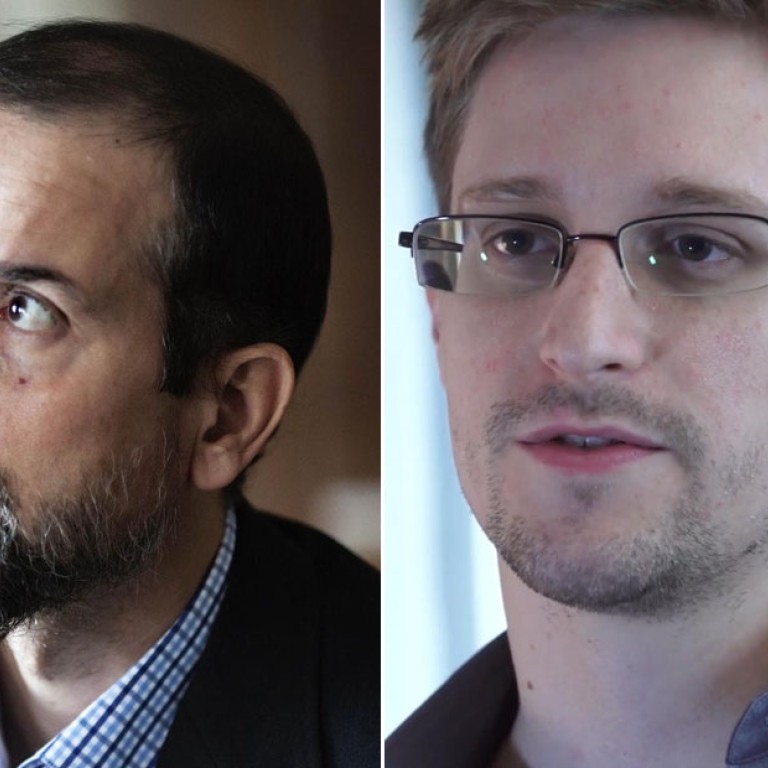
Edward Snowden and Sami al-Saadi cases 'show double standards'
Activist contrasts HK's sticking to rules for NSA leaker with abrogation of them for dissident
Both men were trapped in the same city, and both were hunted by the CIA while seeking a safe haven.
Edward Snowden and Sami al-Saadi came to Hong Kong not knowing what awaited them. But their lives took very different paths once they set foot in Chep Lap Kok airport.
Snowden, a former American spy, escaped the clutches of US justice because Hong Kong was a stickler for the absolute letter of the law. The national security leaker found safe passage to Moscow and avoided extradition to the United States.
Libyan dissident Saadi was forced onto a secret rendition flight to his home country, along with his young family, with a flagrant disregard for due process. Saadi was delivered into the hands of late dictator Muammar Gaddafi, whose henchmen tortured him for years.
While the global political backdrop to the cases was markedly different, the stark contrast in the way they were treated has led a global human rights campaigner to accuse Hong Kong of double standards.
"The treatment of Edward Snowden highlights the mistreatment of Sami al-Saadi and it is damaging to Hong Kong's claims to fairness, due process and democracy," said Agnes Callamard, executive director of Article 19, a London-based human rights organisation that advocates freedom of expression and information.
"Saadi was expelled from Hong Kong with no ability to defend himself or his family; all due process was violated. He could not fight back, so at a basic level he was losing before he started. It's a major human rights violation."
Snowden arrived in Hong Kong on May 20 and left on a flight to the Russian capital 34 days later. In his wake he left explosive details of the US National Security Agency's electronic surveillance programmes in Hong Kong and the mainland.
Justice officials said a US extradition request was incomplete because it did not provide Snowden's correct middle name or his passport number.
Such details did not protect Saadi, who arrived in Hong Kong in March 2004 with his family en route to safe haven in Norway. He had spent most of his life in exile.
Instead, Saadi - who the CIA suspected was a terrorist - and his family were detained for two weeks with no legal representation before being forced onto a flight to Tripoli, where he was immediately jailed and tortured.
While Snowden's actions prompted wide-ranging debate about privacy and government accountability, there has been a chilling silence from all parties involved in the Saadi case.
"It is with the most difficult cases that you judge democracy and test human rights protection and in this situation, the Hong Kong government failed completely and utterly," Callamard said.
When Snowden was still in Hong Kong, Secretary for Security Lai Tung-kwok was asked if the government would offer him protection, to which Lai said: "Any person who considers his life to be at risk could seek help from the police."
In the days following Snowden's departure, Secretary for Justice Rimsky Yuen Kwok-keung said extradition requests were handled according to the city's laws and unlawful or unfair treatment would not be allowed.
But the authorities did little to protect Saadi or his family when the CIA and its British counterpart MI6 asked local authorities to handcuff them and bundle them onto an empty, darkened plane without saying where they were going.
The Libyan's plight only came to light after CIA documents were found at the Tripoli offices of Gaddafi's intelligence chief, Musa Kusa, in August 2011 after the Libyan capital fell to rebels.
They show the secret backroom dealings between Gaddafi's henchmen and US spies. They also show the Hong Kong authorities demanding assurances that Saadi and his family would be "treated humanely and in accordance with human rights standards".
However, no government department will say if these assurances were given.
"This case is quite horrendous and was made possible because freedom of information and expression and access to justice - the essential ingredients to human rights and accountability - are probably not strong enough in Hong Kong," Callamard said.
Today, as Snowden settles into his new life in Russia, where he has been granted political asylum for a year, Saadi is still struggling to rebuild his life and that of his family in Libya.
